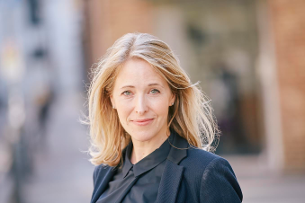
5 Minutes with… Clare Donald

Producers are the oft-unsung heroes of advertising. They’re the ones that turn your dazzling ideas into reality, they’re the ones who make shit happen. That’s why Ogilvy & Mather London has created the position of Chief Production Officer for Clare Donald. If any discipline deserves a place in the C-suite, it’s production. And Clare, who joined the agency just a few months ago, brings a wealth of experience. In the past, she’s headed up production at places like Havas Worldwide London and Mother, but her most recent position was Head of Operations at Google Creative Lab, which has given her the skills and understanding to spearhead production in the age of constant technological disruption.
It’s not just production
smarts that makes Clare such an interesting thinker. She’s a Cambridge graduate
with a strong sense of justice and, as it happens, a fantastic nerd when it
comes to all things outer space. LBB’s Laura Swinton caught up with her to pick
her considerable brains…
LBB> You joined Ogilvy & Mather London as part of the senior management line-up, the first time production has been included alongside the other disciplines (Creative, Planning, Accounts, etc.). Why is it important for the business today that production is invited to the top table? And why do you think that it hasn’t always been the case before?
CD>
Advertising is sometimes a mirror of the changes in the world, and occasionally
a leader. Whichever of the two, it should always be critically plugged into the
contemporary zeitgeist. This is in terms of what we produce – and inevitably
how we produce it. As communication has grown from TV and print alone, to the
interactive multi-media proliferation of digital marketing (in all its myriad
forms), we’ve had to adapt and grow. And whilst THE IDEA is always key – the
means of bringing it to life are more nimble, agile, versatile and of course
complex. The production brain is exactly what agencies need to navigate this
new world. And our business leaders acknowledge that. So producers – those
whose skill-sets are strategic, creative, pragmatic and resourceful – have come
centre stage. Advertising cannot survive without us.
LBB> Over the past eight years or so, this slightly hipster-y concept of being a ‘maker’ has grown in prominence across the industry. Do you think this movement has helped to shine a light on the importance of what producers do, elevating them in the eyes of the rest of the industry?
CD>
Funny. Not thought of it as ‘hipster-y’ before, but does make me chuckle when I
hear the term (‘we’re all makers now’). Truth is, there is an inverse ratio
between content requirement v time and money. We can no longer leave production
as an after-thought in a linear process. If the ‘makers’ are not involved right
from the start, the delivery expectations of our clients will not be met.
LBB> One of the fascinating developments that’s happening in production is the way that data and programmatic VOD means that video content is becoming more fluid even after delivery. (E.g. A-B testing different edits, creating many more versions to target ever more granular online audiences, being able to go back and refine / re-edit video content in response to data.) What sort of impact is this having (or will it have) on the way your teams work and think? Is it something the production side of the industry is ready for?
CD>
There are two sides to a production brain: creative and organisational. The
proliferation of versions and the management of edit changes just requires us
to hone the latter skills. Version management (data, naming, digital archiving,
access to smart editing processes) have always been within our lexicon. We’re
developing specialist departments whose sole responsibility is to own this part
of the production cycle – but it’s not new. Just more of it.
LBB> It’s been interesting to see how different agency networks and holding companies have been looking to organise production going forward. So there are the likes of Hogarth etc. designed to keep revenues within the holding group, some agencies are leaning out their production so that it’s a more fluid, freelance-heavy beast whilst others are bringing more capabilities in house. And then there are the media agencies with their new ‘content’ creation’ hubs… Which model do you see winning out?
CD>
I’m afraid I’m going to give a typical production answer – it depends upon the
agency, the client needs, the end product. At Google, we had a model where we
kept a small permanent team of brilliant people with a deep brand knowledge and
versatile skills. We brought in freelance specialists to suit the need of the
project. At Ogilvy & Mather London, we have a bigger permanent team and
bring in freelancers less often. But we’ll always need a flexible approach. And
as the freelance market grows, there is a fabulous pool of people to call on. I
favour continuity over churn, but no agency can afford to keep on 100% resource
for every eventuality. It’s always going to be a mixed bag.
LBB> And we’ve been hearing a lot about AI over the past year, how we could see AI taking over several parts of the production (from editing to grading to casting even). Realistically, is this something we’re likely to see? What are your thoughts on this?
CD>
AI has been with us for many years. We barely realise how prolific it is. And I
am quite sure that as automation grows, so will AI. But my thoughts on AI for
the creative elements of our trade – I sincerely hope that human creative
genius is never taken out of the process. I was very loosely involved with
Deepmind’s alpha-go project at Google – where AI began to develop an almost
instinctive ability to gaming. But please no. Leave the grading to us.
LBB> What first attracted you to production? And can you remember the first production project you worked on?
CD>
I am very shallow. I applied for a job in the Guardian in 1990 for a ‘graduate receptionist’
in a commercial production company having left university with no idea what I
wanted to do. I looked at some of the work – which included an ad with Paula
Yates and Oliver Reed – and was bowled over by the glamour… Fortunately I was
brought back to earth on my first production – running film magazines back and
forth in front of the stage where we were filming the Labour Party conference
for a 1990 political broadcast film. Fell in love with Neil Kinnock.
LBB> You started your career producing for directors like Ivan Zacharias and also worked for a while in feature films – what was it about the agency world that tempted you across?
CD>
I absolutely loved being a production company producer. But it’s a very hard
career to manage with kids. There was a year when I was producing for Daniel
Barber where I was actually out of the country more than I was in it. So when I
got pregnant first time, I decided to investigate the more manageable work-flow
of the agency world. And I loved it. Seeing an idea develop form brief to final
deliverable and being involved at every level – is enormously satisfying.
LBB> At Google Creative Labs I guess you had the opportunity to really get stuck into the possibilities that technology presents as well as the realities of producing work that represents the cutting edge of digital. What were the key things that you gained from the experience of working there for three years?
CD>
It’s hard to summarise the key things. My knowledge of all things digital and
technical grew exponentially. I went in as a (primarily) film producer, and
came out being able to speak a new language. I’m not fluent – but Google opened
up my mind to so many new possibilities. It’s a fantastic working environment
where they actually encourage people to jump in to areas where you’ve never
been before. And if you have the kind of mindset where that’s exciting, the
opportunities are endless. All good producers love to learn new things – Google
enabled that work with the accelerator pressed to the floor.
LBB> Inside Abbey Road is one of my favourite projects from your time at Google. From a production point of view, what were the biggest challenges involved in that job?
CD>
Well – very glad you liked it, of course. I was not the hands-on producer on
this project (we actually had a few over its duration), but I think the biggest
challenges were creating a seamless 360 journey with all the footage that made
up the experience, and of course music rights negotiation gave us some
headaches too. Abbey Road studios were really supportive around that. They were
great to collaborate with.
LBB> What was it about the opportunity at Ogilvy & Mather London that appealed to you?
CD>
A number of things appealed to me about coming to Ogilvy & Mather London.
Firstly, it was the people. I’ve worked with Mick (Mahoney - CCO) before and
absolutely love that partnership. But I really liked both Charlie (Rudd - CEO)
and Kevin (Chesters - CSO) from the off. That ‘team’ relationship has just got
better and better. Secondly – the role felt unique and I knew that my new team
needed someone to take on production at the agency and completely reimagine the
way we worked. It’s terribly exciting, and is proving to be everything I hoped
for in terms of opportunity and support.
LBB> And you’ve only been in the role for a few months, but what are you hoping to achieve in your role and what’s your vision for production at the agency?
CD>
Three months actually! I want to keep the momentum around production going, so
that it’s not just me on the top table, but that production is represented at
senior levels for every client with dedicated specialists who will be involved
across all work at all stages. The impact of a production brain from brief to
delivery has been a colossal missed opportunity. I want to grow my team with
the very best out there and empower them to have a real voice across all our
work.
LBB> In your Twitter bio, you describe yourself as ‘occasionally angry, always reasonable’. So, what really winds you up? (And what’s the key to staying reasonable?)
CD> God – wrote that a very long time ago! I guess anything that feels unfair winds me up. People in positions who are not delivering, but still rewarded winds me up. Loud voices without substance wind me up. Wilful ignorance and self-interest drive me crazy. And a low heart rates keeps me reasonable.
LBB> Outside of work what are you passionate about? What inspires you?
CD>
Space exploration. Get all tingly when I read about what’s being discovered in
our universe. In the next life I will be an astrophysicist.













